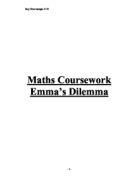GCSE COURSEWORK Matthew Kilgour 25/8/01
Arrangements for Emma: 4 letters, 2 the same.
.emma 2.emam 3.eamm 4.mmae
5.mmea 6.meam 7.mema 8.mame
9.maem 10.amme 11.amem 12.aemm
In a word/name with 4 letters and none the same, then there are 24 possible arrangements.
There are 12 possibilities; note that there are 4 total letters and 3 different. Emma has four letters, three of which are different. This means that it only has 12 possible combinations. I had noticed that 4 (number of total letters) multiplied by 3 (the number of different letters) equals 12.
What if all the letters were different like in Lucy?
Arrangements for Lucy: 4 letters, all different, none the same.
As I stated before, in a word with 4 letters and none the same, there are 24 possible combinations, double the number of combinations for Emma, which has 4 letters and 3 the same.
.lucy 2.luyc 3.lcyu 4.lycu 5.lcyu 6.lyuc
7.ulcy 8.ucly. 9.uylc 10. ulyc 11.uycl 12. ucyl
3.yucl 14.ycul 15.yluc 16. ylcu 17.yclu 18.yulc
9.cluy 20.clyu 21.cylu 22.cyul 23. Culy 24.cuyl
noticed that with Lucy, there are six combinations starting with each letter. Eg. 6 with L, 6 with U etc. I had also noticed that 6 x 4 (the number of letters) is 24, the total number of possibilities.
Arrangements for Emma: 4 letters, 2 the same.
.emma 2.emam 3.eamm 4.mmae
5.mmea 6.meam 7.mema 8.mame
9.maem 10.amme 11.amem 12.aemm
In a word/name with 4 letters and none the same, then there are 24 possible arrangements.
There are 12 possibilities; note that there are 4 total letters and 3 different. Emma has four letters, three of which are different. This means that it only has 12 possible combinations. I had noticed that 4 (number of total letters) multiplied by 3 (the number of different letters) equals 12.
What if all the letters were different like in Lucy?
Arrangements for Lucy: 4 letters, all different, none the same.
As I stated before, in a word with 4 letters and none the same, there are 24 possible combinations, double the number of combinations for Emma, which has 4 letters and 3 the same.
.lucy 2.luyc 3.lcyu 4.lycu 5.lcyu 6.lyuc
7.ulcy 8.ucly. 9.uylc 10. ulyc 11.uycl 12. ucyl
3.yucl 14.ycul 15.yluc 16. ylcu 17.yclu 18.yulc
9.cluy 20.clyu 21.cylu 22.cyul 23. Culy 24.cuyl
noticed that with Lucy, there are six combinations starting with each letter. Eg. 6 with L, 6 with U etc. I had also noticed that 6 x 4 (the number of letters) is 24, the total number of possibilities.







